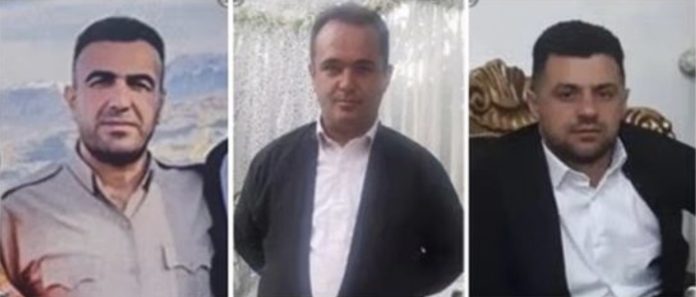On Wednesday, three Kurdish men — Edris Ali and Azad Shojaei from Sardasht, and Rasoul Ahmad Mohammad, a resident of Sulaymaniyah in the Kurdistan Region of Iraq — were executed in Urmia prison. They had been accused of “espionage for Israel”. They were arrested in July 2023 in the border city of Sardasht by Iran’s Ministry of Intelligence, who then transferred them to their detention centre in Urmia.
According to human rights sources, they were subjected to months of severe physical and psychological torture in solitary confinement in an attempt to force them to make false confessions. Initially, they denied all charges, but they were coerced into self-incrimination under pressure and torture. Intelligence interrogators accused the men of collaborating with Mossad and of smuggling equipment allegedly used in the assassination of nuclear scientist Mohsen Fakhrizadeh.
Edris Ali and Azad Shojaei were border couriers (kulbars) from the village of Doleh Ghermeh, while Rasoul Ahmad Mohammad was a tradesman from Iraqi Kurdistan. They were held in solitary confinement for over eight months before being transferred to Urmia Central Prison, where they were finally allowed limited contact with their families and legal representation. Prior to that, during the interrogation and prosecution phases, they were denied access to independent lawyers.

Their trial took place in October 2023 at Branch 2 of the Islamic Revolutionary Court of Urmia, presided over by Judge Shahin. The death sentences were issued in early November and later confirmed. Despite serious concerns regarding due process violations and the use of torture, the Iranian judiciary proceeded with the executions.
Asghar Jahangiri, spokesperson for Iran’s judiciary, announced in November that these three individuals had been sentenced to death in the preliminary stage of the trial related to the assassination of Mohsen Fakhrizadeh. He claimed they were part of a group of eight arrested in West Azerbaijan Province, accused of smuggling “assassination equipment” into Iran under the cover of alcohol trafficking. However, the trial process has been widely criticized for its lack of transparency and systematic human rights abuses.


